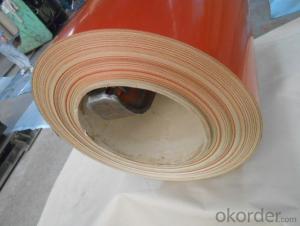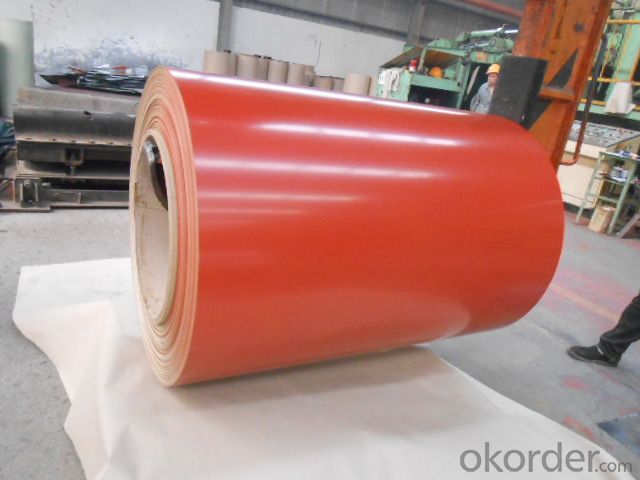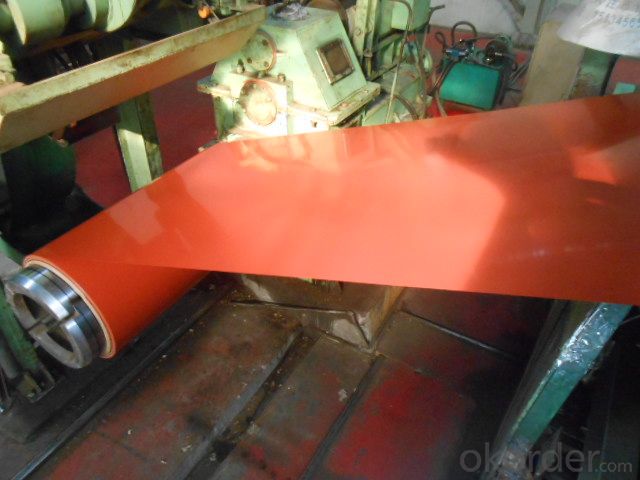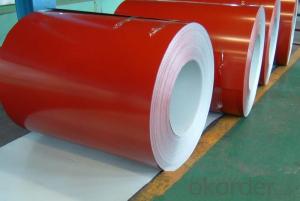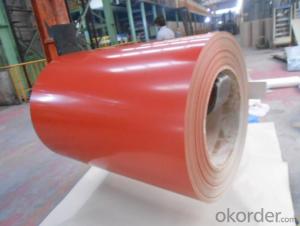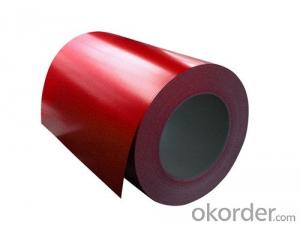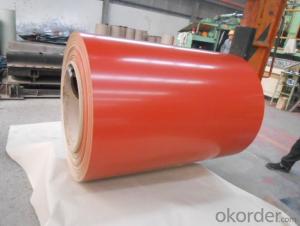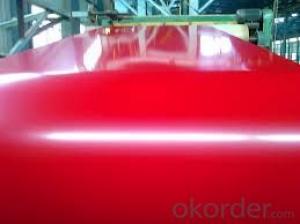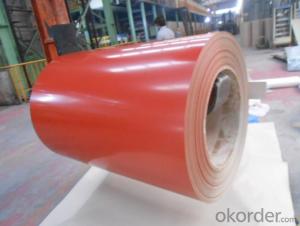Pre-Painted Galvanized Steel Coil with Prime Quality Red Color
- Loading Port:
- Shanghai
- Payment Terms:
- TT OR LC
- Min Order Qty:
- 200 m.t.
- Supply Capability:
- 20000 m.t./month
OKorder Service Pledge
OKorder Financial Service
You Might Also Like
1. Pre-Painted Galvanized/Aluzinc Steel Coil Description:
With GI as base material, after pretreatment (degrease and chemical treatment ) and liquid dope with several layers of color, then after firing and cooling, finally the plate steel is called pre-painted galvanized (aluzinc) steel. Pre-painted galvanized steel is good capable of decoration, molding, corrosion resistance. It generally displays superior workability, durability and weather resistance.
2.Main Features of the Pre-Painted Galvanized/Aluzinc Steel Coil:
• Excellent process capability
• Smooth and flat surface
• Workability, durability
• Excellent heat resistance performance
• High strength
• Good formability
• Good visual effect
3.Pre-Painted Galvanized/Aluzinc Steel Coil Images
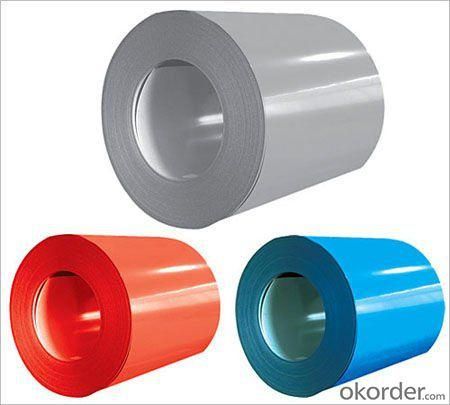
4.Pre-Painted Galvanized/Aluzinc Steel Coil Specification
Standard: AISI, ASTM, BS, DIN, GB, JIS
Grade: DX51D, DX52D
Thickness: 0.17-2.0mm
Brand Name: KMRLON
Model Number: coil
Type: Steel Coil
Technique: Cold Rolled
Surface Treatment: Coated
Application: Boiler Plate
Special Use: High-strength Steel Plate
Width: 20-1250mm
Length: customized
commoidty: pre-painted galvanized steel coil
Thickness: 0.13-4.0mm
width: 20-1250mm
zinc coating: 40-180g/m2
printing thickness: top side: 20+/-5 microns, back side: 5-7 microns
color: all RAL color
surface treatment: color coated
coil weight: 4-7 tons
coil ID: 508/610mm
packaging: standard seaworthy packing
5.FAQ of Pre-Painted Galvanized/Aluzinc Steel Coil
1. What’s the application of this product?
Roof, roof structure, surface sheet of balcony, frame of window, etc.
2. What’s the brand of the paint?
We use the best brand of all of the word—AKZO.
3. How to guarantee the quality of the products?
We have established the international advanced quality management system,every link from raw material to final product we have strict quality test;We resolutely put an end to unqualified products flowing into the market. At the same time, we will provide necessary follow-up service assurance.
4. How long can we receive the product after purchase?
Usually within thirty working days after receiving buyer’s advance payment or LC. We will arrange the factory manufacturing as soon as possible. The cargo readiness usually takes 15-25 days, but the shipment will depend on the vessel situation.
- Q: 3 bedroom rambler with attached garage. A bad hail storm in May damaged my white siding and roof. I am concerned insurance adjustThanks much.er will not give me replacement value for steel siding. Any one know the cost and where to buy in Minnesota.
- they both cost around the same
- Q: How are steel coils used in construction?
- Steel coils are commonly used in construction for a variety of applications, such as structural components, roof panels, and wall cladding. These coils are typically shaped and cut into specific lengths to meet the required dimensions of the construction project. They provide strength, durability, and versatility, making them an essential material for various construction purposes.
- Q: Does anyone know what is 12 gage Cold Rolled Steel meaning? Also, help me to describe it.Thank you so muck ~!Mark Lin
- It's gauge.
- Q: How are steel coils processed and shaped for specific applications?
- Steel coils are processed and shaped for specific applications through a series of steps. First, the coils are uncoiled and flattened to remove any bends or curls. Then, they undergo various processes such as cutting, slitting, or shearing to achieve the desired dimensions. Next, the steel is often subjected to heat treatment, such as annealing or tempering, to enhance its strength and flexibility. Finally, the steel is shaped into specific forms using techniques like rolling, bending, or stamping, to meet the requirements of different applications ranging from automotive parts to construction materials.
- Q: How are steel coils used in the production of electrical wiring?
- Steel coils are used in the production of electrical wiring as a core material for the conductors. The steel coils are typically shaped into a cylindrical form and coated with an insulating material. This helps in providing structural support to the wiring and also enhances its conductivity and durability.
- Q: I expect that I will be questioned about my knowledge in methoding for steel castings, in a interview. I dont know about it. Can someone explain me in simple language and give me some links, like how I can explain methoding for steel castings.....key points...help please...so that i will pass the interview as if I have experience in methoding....thanks
- It is very difficult to define Methoding of Steel castings by one sentence. Actually it encompasses the total casting process. Normally it would mean a) Pattern design i.e. what type of pattern it would be- wooden, metallic, split or full, loose or fitted on a match plate or any other, how will be the parting line. b) Design of the gating system. c) Design of risering i.e. numbers, size and location of risers. d) Design of molding process i.e. sand system to be used, mold box size. But to do justice to the above mentioned activities, you need to consider other parameters of the casting process such as chemical composition, solidification characteristics, pouring temperature, pouring time, knock out time etc. As I said Methoding of Steel castings means designing of the total casting process from inception to final product.
- Q: it seems like the hardness of Stainless steel, i saw 410c stainless stell, i saw 440c stainless steel, what does it means anyway?
- 440 okorder
- Q: How are steel coils used in the manufacturing of electrical components?
- Steel coils are commonly used in the manufacturing of electrical components as they provide a sturdy and reliable framework. They are used to create magnetic cores, which play a crucial role in transformers, motors, and generators. Additionally, steel coils are utilized in the production of inductors and solenoids, where they help generate and control magnetic fields. Overall, steel coils are essential in electrical component manufacturing due to their ability to enhance the efficiency and functionality of these devices.
- Q: I have a white gold engagement ring, and to be special I thought I'd get a plain band from Tiffany's--in stainless steel. Can stainless steel be worn with white gold or will there be a difference in the color or texture? I'm not planning on getting them soldered together, but I don't want it to be noticeable that they are different metals. Does anyone have experience in this subject?
- I am a manufacturing Jeweller. Yes there is a difference in the colour between Stainless Steel and White Gold. The wear characteristics are also different so you will notice a difference in the wearing of the rings. I would doubt that tiffany's would make stainless steel rings. Most likely they are stocking Titanium rings, which look like stainless steel. But the same problems of colour and wear exist for that metal as well. Your best bet is to get a white gold ring , and check out other manufacturing jewellers first because you will not be getting an investment from Tiffany's. Their profit margin is that high you would get a nosebleed. the scrap value of a 5 gram 18ct white gold wedder is $120. anything over that is the profit margin of the jeweller. for a plain wedder I charge $20 per gram to make plus the gold so that would be a total cost of $220 for a 5 gram ring and $440 for a 10 gram ring. I hope this is good information to you Also you must ask what type of 18ct white gold are you getting? there is; Platinum alloy Palladium alloy Irridium alloy Nickel Zinc alloy or a combination of any or all of the above with prices accordingly
- Q: I have the game of the year edition for fallout 3 but there's no mission or quest saying it's called broken steel so what is it actually called and where is it? Please describe the quest in case I mightve already done it without even knowing.
- Broken Steel fixes the original ending of the game so that you can continue past the end and continue exploring. The Broken Steel missions also take place after the original ending of the game. One way you can tell if Broken Steel is working though is if you are finding enemies added with Broken Steel (Super Mutant Overlords, Hellfire Enclave Troops, and so on), and if you can level up past level 20 and get new perks added between 20 and 30. You can even see all of these new perks any time you level up, so next time you level up, scroll down and see if there are new perks below the level 20 perks. If there are, then Broken Steel is working properly.
Send your message to us
Pre-Painted Galvanized Steel Coil with Prime Quality Red Color
- Loading Port:
- Shanghai
- Payment Terms:
- TT OR LC
- Min Order Qty:
- 200 m.t.
- Supply Capability:
- 20000 m.t./month
OKorder Service Pledge
OKorder Financial Service
Similar products
Hot products
Hot Searches
Related keywords
